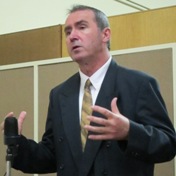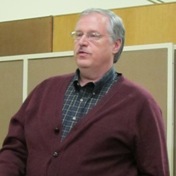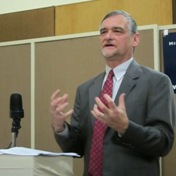Dr. Sunic Addresses Successful IHR Meeting
News from the Institute for Historical Review
European-American author and scholar Tomislav Sunic was the featured speaker at the IHR meeting on Saturday evening, March 6, 2010. His two presentations, along with informative talks by other speakers, and food, drinks and lively fellowship, made this a memorable occasion.
Among the 30 or so men and women who met at the Institute’s offices in southern California were students, engineers, businessmen, attorneys, community activists, scholars, and a month-old infant. (Limited space and seating restricted the number of invitations for the gathering.)
 Tom Sunic |
 Bruce Leichty |
 Mark Weber |
Dr. Sunic has served as a professor of political science in the US, and as a Croatian diplomat. His most recent book is Postmortem Report, a 224-page collection of essays that critically examines the postwar Western liberal-democratic order. (His website is http://www.tomsunic.info/ )
In the first of his two talks, entitled “A Forgotten Genocide: Ethnic Germans in Postwar Central Europe,” Sunic provided an overview of the brutal “ethnic cleansing” of Germans in the aftermath of World War Two, in which some twelve million people, mostly women, children and elderly, were forcibly expelled from centuries-old homelands in eastern and central Europe. Of these, some two million were killed or otherwise perished. (For more on this subject, see “An ‘Unknown Holocaust’ and the Hijacking of History” [ https://ihr.org/other/july09weber.html ], and the book After the Reich [ https://ihr.org/other/afterthereich072007.html ] ).
Germans were not the only victims of vindictive and genocidal oppression by the victors in the aftermath of the war, he noted. Croats and other European peoples were also brutally mistreated.
Sunic contrasted the way in which this massive genocide is all but ignored in the American and western European media, whereas Jewish “victimology” has become a central feature of our society’s “civic religion.”
In his second address of the evening, entitled “Nationalism in Europe Today: A Firsthand Report,” Sunic said that Europeans and people of European descent and heritage should reject the imposed feelings of guilt that are fostered by the mainstream media.
The prevailing social-political order is not as strong or as solid as it pretends to be, or as most people assume, he said, and suggested that, under the right conditions, nationalist sentiments could awaken quickly. In that regard, he recalled the collapse of Yugoslavia in 1990-91, and how even seemingly fervent Communist supporters of the multi-ethnic, multi-cultural federation “switched” over the course of a few months, rebranding themselves as nationalists. If or when the liberal-democratic system begins to collapse in the United States, Sunic suggested, white nationalist sentiment might likewise quickly arise among the many tens of millions of Americans of European ancestry and heritage.
The prospects for success may actually be greater in the US than in Europe, Sunic said, because European nationalists are divided by borders and language. Moreover, bitterness based on past injustices sometimes hampers effective cooperation. In that regard, he cited entrenched distrust between Serbs and Croats, and Poles and Germans.
Richard Herman, a retired engineer who lived for years in the Middle East, spoke about the way in which terrorism in that region is misrepresented and therefore often misunderstood. “Palestinian Arabs are enduring the longest military occupation in modern times — 43 years. Lacking airplanes, tanks and helicopters, they oppose it using the one means at their disposal: terrorism.” Noting that Zionists were the first to introduce terrorism into the Palestine conflict, he recalled the careers of two prominent Zionist leaders: Menachem Begin and Yitzhak Shamir.
Begin was head of the Irgun Z’vai Leumi, the group responsible for the bombing of the King David Hotel in July 1946, an act that British prime minister Atlee called a “brutal and murderous crime, a “dastardly outrage” and an “insane act of terrorism.” Later Begin was prime minister of Israel, 1977-1983.
Shamir, another Israeli prime minister, had been a leader of the Lehi or “Stern Gang” during the 1940s. Among the outrages carried out by this group was the September 1948 murder of Swedish UN peace envoy Count Folke Bernadotte. The United Nations Security Council called the perpetrators “a criminal group of terrorists.”
Bruce Leichty, a California lawyer who has served as the US attorney for Ernst Zundel, provided an update on the ordeal of the German-born publicist who had been released earlier in the week from a German prison. After seven years and three weeks behind bars, Zundel was released on March 1 from the prison in Mannheim, Germany, where he had been held for criminal “popular incitement” through publication of writings that “deny the Holocaust.” (For more on Zundel and his ordeal, see http://www.revisionists.com/revisionists/zundel.html )
Zundel is still not a free man, said Leichty. He remains subject to German censorship laws that forbid free expression of opinion about World War Two and the Holocaust. Leichty spoke of some of the difficulties in his efforts to overturn a 20-year-ban against Zundel’s return to the United States. He was not optimistic about the prospects of a just decision from US federal courts, and suggested that a favorable outcome could hinge on the discretion of State Department officials, who may be influenced by citizens’ expressions of concern.
Ernst Zundel’s ordeal and suffering have “special meaning for me,” said Mark Weber in his address to the meeting, because their relationship goes back more than 20 years. The IHR director recalled his role in the great “Holocaust trial” of 1988 in Toronto, in which he testified on Zundel’s behalf as a court-recognized expert witness on Germany’s wartime policy and the “final solution.” Weber also mentioned that Zundel had addressed IHR conferences in 1994 and in 2000. And during the seven years he was behind bars, Weber went on, he worked to inform the public about Zundel’s plight, and to explaining why he and others have been fined, imprisoned and forced into exile for expressing dissident views about twentieth century history.
“A good measure of the double standard of the American mainstream media,” said Weber, is to compare the way it portrays Zundel, and the way it portrays Nelson Mandela. Although each has been a political dissident who was imprisoned for years, their cases are quite different, and how they are portrayed in the media could hardly present a more striking contrast.
Zundel, of course, is routinely vilified and smeared in the US media, and no American politician dares to defend his rights.
Mandela was held for years in prison in South Africa when the country was run by its white population. After his release, power was transferred to the country’s major black political party, the African National Congress (ANC), and he became president in 1994. For decades he has been praised by politicians and portrayed in the media as a man of peace, and as a wise and even heroic leader. “Invictus,” a major motion picture that is currently showing across the country, is typical. Its portrayal of Mandela, who is played by actor Morgan Freeman, is sympathetic and flattering.
But unlike Zundel, Mandela was imprisoned not for his views, but for his crimes of violence. Mandela was head of the armed wing of the African National Congress and the South African Communist Party. During his trial, he pleaded guilty to dozens of acts of violence, including bombings in the Johannesburg railway station and other public places that took the lives of children and other innocent people. For years he was on the US government’s terrorism watch list. On a number of occasions, Mandela was offered freedom from prison if he would only renounce terrorist violence. He refused.
In our society, said Weber, the mainstream media presents history and current affairs — whether the subject is the Israel-Palestine conflict, Middle East history, World War Two, terrorism, or freedom of speech — from a consistently Judeocentric perspective.
The Institute for Historical Review and similar dissident groups, said Weber, are routinely smeared by Zionist, leftist and neo-Marxist groups, such as the Anti-Defamation League and the equally misnamed Southern Poverty Law Center. As part of their efforts to discredit the IHR, both the ADL and SPLC make use of quotes falsely attributed to Weber. During the past year, said Weber, enemies of free speech have harassed and intimidated a local hotel where the IHR has held meetings. In the aftermath of this campaign, the hotel told us that we are no longer welcome.
We regard such attacks, Weber said, as a “badge of honor,” and as “confirmation of our effectiveness.”
Some people are reluctant to support the IHR and similar independent groups because they fear the embarrassment of being criticized or called names, said Weber. But whatever embarrassment or financial setback people might endure in speaking out, or in supporting the IHR and similar groups, he added, that is really very little compared to the sacrifices made by many Americans of past generations.
Soldiers during the American civil war, both Union and Confederate, endured great privation, month after month, year after year, Weber stressed, often in scorching heat and oppressive humidity, or in rain, snow and freezing cold. The great mass of men who served in the opposing armies, the regular foot soldiers, normally slept every night on the ground. Nearly half a million lost their lives, mostly due to disease and privation. Many others lost their health. Back at home, their wives and families, deprived of the support and labor of their men, also sacrificed.
Concluding the meeting was a upbeat, crisply delivered talk by a local businessman who praised the spirit, content and frequency of IHR meetings, and appealed to attendees to support the Institute and its work.